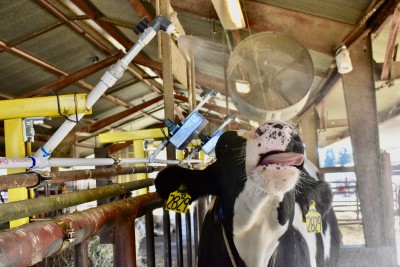Considerations for Cow Cooling this Year
Alycia Drwencke, Dairy Management Specialist
Southwest New York Dairy, Livestock and Field Crops Program

Considerations for Cow Cooling this Year
Cornell Cooperative Extension shares information on providing heat abatement to cattle
By Alycia Drwencke, Dairy Management Specialist, with the SWNY Dairy, Livestock, and Field Crops Program
SOUTHWEST NEW YORK (March 5, 2021) - Cornell Cooperative Extension's Southwest New York Dairy, Livestock, and Field Crops Program (SWNYDLFC) shares information on cow cooling for the 2021 season. While heat stress in dairy cows may not be at the forefront of anyone's mind with several inches of snow and ice on the ground and temperatures barely above freezing, it is important to start thinking about the upcoming warm seasons. Preparing for warm weather now can help farms prevent losses in milk production and keep cows comfortable in 2021.
Cows, especially dairy animals, are much less tolerant to heat than humans. They are uncomfortable and can experience heat stress beginning at 68 degrees Fahrenheit. To help keep cows cool farms provide shade, fans, and spray water. Best practice is to provide these in both the holding area of the milking parlor, and in the home pen where cows spend their time eating and resting. Farms should use the coming weeks to perform any necessary repairs to cooling equipment and do a thorough cleaning of fans and sprayers, as dust easily builds up and reduces energy efficiency of these technologies. If farms are upgrading or installing additional cooling equipment, now is a perfect time so cows can benefit from the upgrades throughout the entire 2021 season.
Additionally, farms should ensure they are providing adequate cooling to all ages and classes of animals on the farm, including calves, heifers, and dry cows. Recent work out of the University of Florida has emphasized the importance of providing heat abatement to non-lactating animals on the farm. Providing shade, fans, and spray water to these groups of animals will promote profitability and increased milk production in your herd across multiple generation. The University of Florida's work shows that cows pass the negative effects of heat stress on to their offspring and will produce less milk during their lactation if they experience increased heat load in the dry period. Further, their work shows that in New York State the dairy industry loses nearly 40 million dollars per year from heat stress. These losses are a result of decreased milk production, fertility, lameness, and feed intake, which all highlight the importance of cooling cattle and the economic benefits of installing fans and sprayers. Opportunities exist to improve cooling and its efficiency on farm by providing supplementary heat abatement, especially to dry cows, heifers, and calves. As farms prepare for the warmer months ahead, take the time to check all cooling equipment is functioning properly for each age and class of animal on the farm. For more information about heat abatement for dairy cows, contact Alycia Drwencke, Dairy Management Specialist, at 517-416-0386 or amd453@cornell.edu.
Upcoming Events
Boots in the Barn: Cornell Dairy Research Updates
January 13, 2026
January 20, 2026
January 27, 2026
February 3, 2026
February 10, 2026
February 17, 2026
February 24, 2026
Join us for some or all!
Advanced Hoof Health Program
January 15, 2026
Belfast, NY
Who should attend?
- Professional hoof trimmers
- Dairy farm owners or managers in charge of farm foot health
Topics include:
- How to Create a Strategic Trimming Program for your Dairy
- The Latest in Lameness Technology for the Dairy Industry
- Housing and Flooring Design: Its Role in Hoof Care
NY Pork Producers Connection Breakfast - Geneseo
January 17, 2026 : Pork Producers Connection Breakfast - Geneseo
Geneseo, NY
All pork producers are invited to join the New York Pork Producers for a free hot farmer's breakfast, at which they'll catch up on topics including the pork to dairy barn conversion series, NYPP digital campaigns, and 840-RFID tags.
Announcements
Cows, Crops & Critters Newsletter Sponsorship
TRYING TO REACH GROWERS AND AGRIBUSINESSES IN OUR SOUTHWEST REGION OF NEW YORK?Weekly Email Update: Shared with 625+ households who have signed up with our program.
Monthly Paper Mailer: To reach our stakeholders and farmers who lack internet access, we send out a monthly mailer where your company's logo and contact information would be featured with a mailing list of 330+ households.
If you sponsor our weekly and monthly publications you reach approximately 955 households.





